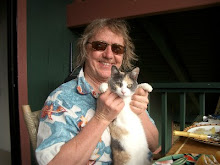An Occasional Bug Is Ok
Another Earth Day has passed and another Endangered Species Day went largely unnoticed because we think they are about nature 'somewhere else'. In the meantime we continue to wreak destruction on the earth at home and on our fellow humans if we don't like their tribe. There is a connection. To bring home the ethics of the environment, nothing could be more profound to say than these simple words: "An Occasional Bug is Ok".
We now teach our children from their earliest years by action and by attitude that if they see a bug it should be killed because it might do something bad, or even if it just makes us or those we love uncomfortable. How can the real world environment and all it's complex interrelated creatures hope to survive such an onslaught of thoughtless, destructive, fear based behavior?
These same children grow to become decision making adults who feel that it is somehow justified to preemptively kill those humans who are not like us, or willingly accept the daily carnage of 'collateral damage' of innocent lives lost, because we think some of those strangers might do something bad to us or those we love. How can real world politics and international coexistence survive such an abysmally self-centered attitude?
It's time to teach our children a new song, both for the earth and for our ethics, and it starts with the words, "An Occasional Bug is Ok".

